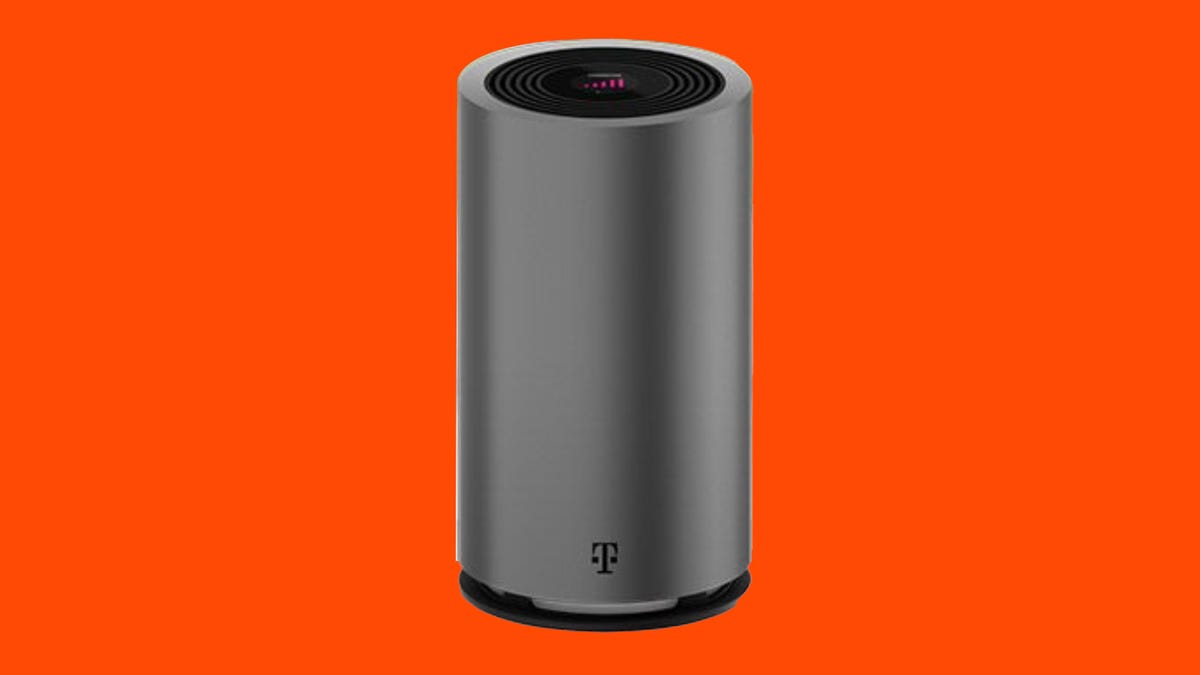 Why You Can Trust CNET
Why You Can Trust CNET
Our expert, award-winning staff selects the products we cover and rigorously researches and tests our top picks. If you buy through our links, we may get a commission. How we test ISPs
If you can get 5G on your phone, you can get 5G internet at your house, right? Not exactly. 5G has been around for a while now, thanks to efforts from major carriers like T-Mobile, AT&T and Verizon, but 5G internet service isn't strictly available at the same addresses as 5G cellular service.
I encountered this problem when I switched my mobile carrier from AT&T cellular service to T-Mobile cellular service and was immediately impressed with the phone's 5G performance. However, even though I got T-Mobile 5G cell service at home, my address wasn't eligible for T-Mobile Home Internet.
It's not just T-Mobile. The same applies to Verizon's cellular service. Its 5G home internet product is also not categorically available at all addresses covered by the company's 5G coverage map. Even if you've got Verizon's Ultra Wideband service in your neighborhood, it's not a given you'll be able to sign up for Verizon 5G Home Internet. Let's get into the details about why.
What is 5G anyway?
Before we get into the details on the main 5G home internet providers, let's clear up any confusion about what 5G actually is.
5G stands for the fifth generation. It represents the fifth generation of wireless data networks, not to be confused with 5GHz, a specific frequency band often used by Wi-Fi routers. If you have 5G home internet, you're using a fully fixed wireless internet connection provided by a cellular provider. You may have a 5G home internet connection that uses a Wi-Fi router with a 5GHz frequency.
Also of note, 5G comes in three different types: millimeter-wave, midband and low-band. Cellular home internet providers often use all three to create strong, varied networks.
Wait, T-Mobile and Verizon offer 5G home internet?

Yes. T-Mobile and Verizon use cellular airwaves to offer dedicated 5G home internet plans. Each provider's plan features straightforward, all-inclusive pricing that ditches equipment fees, data caps, term agreements and other added hassles often associated with internet service providers.
T-Mobile Home Internet features two plans for $50 or $70 per month for the same speeds (for $20 extra a month, you get a mesh Wi-Fi Access Point and 24/7 technical support). Verizon offers two plans -- Verizon 5G Home ($50 a month) and Verizon 5G Home Plus ($70 a month). Qualifying Verizon and T-Mobile phone plans can also knock $15-$25 off the price of your monthly bill. Thankfully, simplicity and a straightforward approach seem to be key for both companies.
What about AT&T, you ask? Though an AT&T spokesperson shared with CNET that "fiber remains our focus," the company also has a 5G home internet offering: AT&T Internet Air. It provides potentially higher download speeds than its hybrid DSL service (up to 225 megabits per second) and is now available in over 100 locations across the US.
If AT&T, T-Mobile and Verizon are serious about home internet, why isn't it as available as their overall 5G coverage?

Verizon also includes its 5G equipment in your monthly fee.
Sarah Tew/CNETWhen my colleague Eli Blumenthal tested Verizon 5G Home, he noted that the 5G connection on his iPhone was better than the one for his 5G Home hub.
He was on to something.
A Verizon spokesperson told me that it designed its network with its mobile customers in mind. "We continue to allocate spectrum to ensure our mobile customers have the reliability they've come to expect from Verizon," they said via email. "As we deploy more spectrum -- in excess of what our models show we need for the highest reliability for our mobile customers -- we are able to offer 5G Home service as well."
5G allows for a greater connection density -- approximately 1 million devices per square kilometer -- than previous generations of cellular connectivity. Is that a lot? Yes, it's about 100 times better than 4G, but it's not limitless.
Telecom insider Jeff Moore, principal of Wave7 Research, believes T-Mobile has also been judicious about how it's selling home internet because of how a home internet product puts a heavy capacity usage on a mobile network.
He pointed me to a YouTube interview with Kendra Lord, T-Mobile's director of geospatial engineering and analytics, where she likened 5G home internet availability to the number of seats on a plane.
"It's not only the number of households that we believe could get [T-Mobile Home Internet]," she said, "but how many within a given sector we could say yes to."
A spokesperson corroborated that mindset when I contacted T-Mobile for further insight. "There are still many households that do not qualify for Home Internet yet, even though they may get 5G on their mobile device -- and that's intentional," I was told via email.
"Our fixed wireless Home Internet runs on the extra capacity on our wireless network. In some areas, we have extra capacity on the network, but in others, we don't. So, we allocate access to Home Internet on a sector-by-sector, home-by-home basis."
In other words, it's entirely possible that I could get 5G cellular service in my home, and my next-door neighbor might even have T-Mobile Home Internet. However, my address might not be serviceable for that home internet product due to the capacity limits for my area's cellular coverage.
Is home internet a side hustle for mobile carriers?

T-Mobile, whose gateway device is shown here, includes equipment in the monthly fee.
T-MobileI was tempted to think that getting into the ISP game was a lark for these companies. Moore considers another layer at play.
"Mobility is the core business for T-Mobile, and for the most part, it's the core business for Verizon," said Moore. "But T-Mobile, in particular, is telling Wall Street that in addition to selling [home internet] services to businesses, it's also saying it's increasingly pushing into rural America. I don't think it's just a PR stunt.
All of the numbers support Moore's assessment. In its Q1 2024 report, T-Mobile proudly announced it had reached over 5 million customers. That's a pretty impressive number coming just two years after the product's nationwide launch.
Overall, T-Mobile has been aggressive in its pitch. In May 2022, it began its Internet Freedom push, which leans into Americans' dissatisfaction with ISPs and encourages people to "break up with Big Internet" by trying T-Mobile Home Internet. To lure customers, it offers a free, 15-day test drive (so you can try it without changing your current provider) and additional savings of $20 per month with eligible Magenta Max mobile plans.
Verizon has also been ambitious with its offers while ringing less of an "ISPs are evil" note. That's probably because Verizon Fios -- the company's fiber-optic internet service -- is an ISP and one of the few that's regularly high-rated. In their case, 5G home internet seems less of a blow against "Big Internet" and more of a play to extend the Verizon home internet game beyond the Northeast (Verizon Fios' playground) and out to the rest of the country.
At the very least, 5G home internet has succeeded in being a convenient and reliable way to get online, especially for rural customers. So the next time you ask, "Why can't I get 5G home internet even though I have 5G on my phone at home?" I advise you to hang tight. Both carriers are actively optimizing their networks for mobile first and home internet second, in a dynamic process that changes month to month. 2024 could be your year to try 5G for your home's broadband connection.